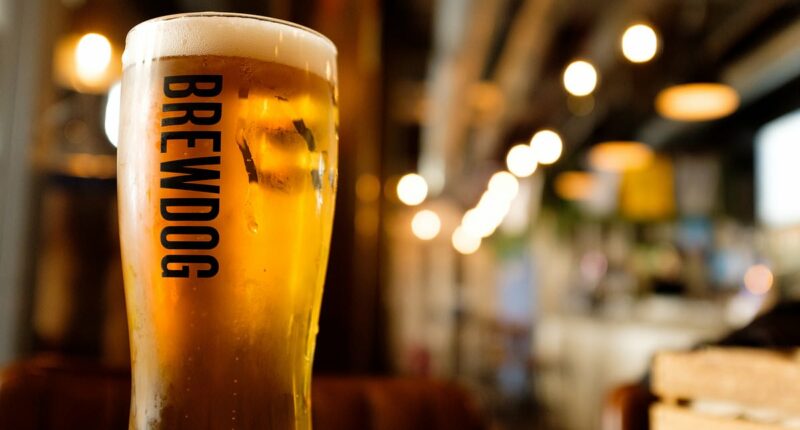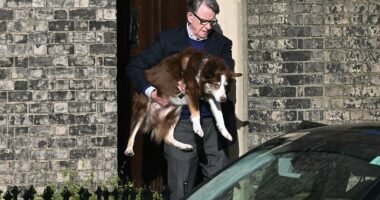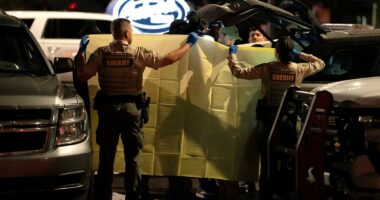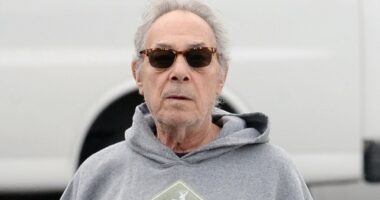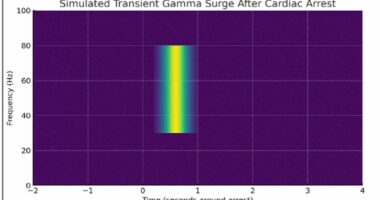Share this @internewscast.com
BrewDog’s beers have been axed by almost 2,000 pubs across Britain as the embattled brewers’ popularity continues to wane.
The company’s range of draught beers have disappeared entirely from around 1,860 pubs in the last two years, according to private industry data.
The blow means BrewDog’s UK distribution has been cut by more than a third.
The report highlights that BrewDog’s popular beer, Punk IPA, experienced the most significant decline, having been pulled from 1,980 pubs, representing a 52 percent drop in its availability.
Pubs are now reducing their offerings or opting for rival beers such as Camden Town and Beavertown instead.
According to the data obtained by the Telegraph, the majority of the pubs discontinuing BrewDog beers belong to large chains, eliminating a crucial revenue stream for the brewer as it endeavors to turn around its struggling business.
The collapse in BrewDog’s UK distribution comes as CEO James Taylor recently told investors that its financials did not make for ‘happy reading’.
BrewDog reported losses amounting to £59 million in 2023 and £30.5 million in 2022. In a recent interview, Mr. Taylor acknowledged that the company faces another loss this year.

James Watt, who labels himself a ‘punk,’ married ‘Made In Chelsea’ star and socialite Georgia Toffolo in March. The Sunday Times earlier estimated their combined wealth at a remarkable £425 million this year.

BrewDog’s beers have been axed by almost 2,000 pubs across Britain as the embattled brewers’ popularity wanes

Co-founder of BrewDog, James Watt, stepped down as CEO in May 2024, shortly after a complaint linked to a BBC documentary outlining allegations against him was dismissed.
Mr. Taylor is the second CEO to assume leadership after founder and public face of the company, James Watt, relinquished his role in May 2024 amidst numerous accusations of misconduct.
An industry insider believes the pub retrenchment will make BrewDog ever more reliant on JD Wetherspoon, whose 794 pubs now make up a significant chunk of its remaining distribution.
Lauren Caroll, BrewDog’s chief operating officer, said: ‘Independent brewers across the board have felt the squeeze from the economic pressures hitting the pub trade.
‘With costs rising and consumers watching their spend, pub groups have been narrowing their ranges, and brewery-owned pubs are putting more emphasis on their own brands.
‘It’s not just us – every independent brewer has been affected. We saw the trend coming, which is why we’ve shifted focus to high-impact channels like festivals, stadiums, and independent [pubs].’
Last month, the company announced the closure of 10 of its own branded bars across the UK, including its flagship site in Aberdeen, after deciding they were not ‘commercially viable’.
And the chain had started the year by closing six pubs across the world, including two in England, three in Europe and one in England.
BrewDog has weathered a number of publicity storms in recent years as its reputation has taken a hammering.

James Watt began dating Georgia Toffolo in 2023, before tying the knot in a low-key ceremony in March 2025

The collapse in BrewDog’s UK distribution comes as CEO James Taylor (pictured) recently told investors that its financials did not make for ‘happy reading’.

James Watt launched the brewery with Martin Dickie (left) amid a flurry of publicity stunts including the launch of a 41 per cent beer (above)

BrewDog’s first standalone bar in Aberdeen’s Gallowgate (pictured) is earmarked for closure
But it has also faced stiff competition from new entrants into the ‘craft beer’ market.
It was founded in 2007 by James Watt and Martin Dickie, rising to prominence in the 2010s amid a surge in demand for independent beers and hoppy IPAs.
Watt showed a knack for marketing and drove up the brand’s popularity with stunts such as driving a tank through London and brewing what it claimed was the world’s strongest beer.
Mr Watt then married Made In Chelsea media personality Georgia Toffolo earlier this year, and has become a frequent critic of the Labour government on LinkedIn.
In May, it was revealed that the newlyweds are worth a staggering £425 million, according to The Sunday Times, overtaking the likes of Ed Sheeran, Lord Sainsburys, Harry Styles and Lewis Hamilton.
However in recent years, the company’s fortunes have started to turn after it emerged staff reported being unhappy working there.
But Mr Watt’s tenure has been marred by controversy in recent years, with the firm accused by former workers in an open letter in 2021 of having a ‘culture of fear’ within the business, with ‘toxic attitudes’ towards junior staff.
BrewDog apologised and promised to ‘listen, learn and act’.
Mr Watt later admitted to being ‘too intense and demanding’ amid a workplace culture row where he was accused of inappropriate behaviour and abusing his power.
Speaking with Steven Bartlett on the Diary of a CEO podcast about his leadership at the company, he admitted to previously pushing people ‘too far’ because of his ‘high standards.’

BrewDog announced last month that it will close 10 bars across the UK, including its Camden branch (pictured)

Mr Watt and Mr Dickie grew up as best friends and became flatmates in Edinburgh

James Watt pictured at his company brewery and office headquarters in Ellon, Scotland

Mr Watt drew criticism in December 2024 when he made a Linkedin post that proposed delaying his marriage to Georgia Toffolo to avoid tax
But Mr Watt – whose company has been accused of having a ‘rotten culture’ – said that his actions were done with ‘100 per cent good intentions.’
BrewDog is now on its third CEO in just over a year after Watt stepped back from the role in May 2024, three months after Ofcom rejected a complaint he had lodged against the BBC after it made a documentary outlining misconduct allegations.
He denied claims that he made female bartenders feel ‘uncomfortable’ and ‘powerless’ and that he would take intoxicated women on private late-night tours of the brewery.
The self-described BrewDog ‘Captain’ faced a number of improper conduct allegations in 2021 concerning female staff, and was revealed to have invested in Heineken, contrasting with his brewery’s anti-establishment ‘punk’ image.
Months before he quit, he announced that the firm would pay staff the ‘real’ Living Wage as calculated by the Resolution Foundation as it struggled to turn a profit.
The firm is continuing to weather accusations of an image problem after ditching its claim to be ‘carbon negative’ after it ditched offsetting schemes that it claimed were both too expensive and not efficient enough to justify the label.
It had already been criticised for using the label by advertising watchdogs, and was slammed by environmentalists for its claim of creating a carbon-negative forest in Scotland after it was revealed that half of the 500,000 saplings had already died.
Despite this, CEO James Taylor told the Grocer in June that he did not believe the firm had an image problem.
He said: ‘It’s boring to focus on data, but the data says consumers think of us as a business that produces really high-quality beer. That’s how we’re perceived by the vast majority of the public.’
Further criticism has been heaped on BrewDog’s decision to sell a stake in the company to the American private equity firm TSG Consumer Partners in 2017, which minted Watt and Dickie as millionaires.
The unorthodox deal forced BrewDog to deliver an 18 per cent compounding return to TSG, which rapidly increases the interest on TSG’s shares every year.
It is believed to threaten the shareholdings of thousands of ‘Equity Punk’ retail investors who poured their money into the brewer as it grew.
In July the Financial Times reported that the terms of that transaction ‘turned what was long regarded as the poster child for crowd funding success into a cautionary tale’.
All the shares sold to retail investors, known as the 130,000 so-called ‘Equity Punks’, will probably be worthless unless a generous buyer suddenly wants to purchase the lossmaking BrewDog.

Mr Watt (left) spoke about the issues he has dealt with at the company on Steven Bartlett’s Diary of a CEO podcast in July 2022

Chancellor Rachel Reeves has been blamed for pushing restaurants and pubs into ‘survival mode’ as two venues have shut per day for the first half of 2025
BrewDog’s latest blow comes as a political storm continues to rumble over the Government’s lack of support for the pub trade.
Chancellor Rachel Reeves has been blamed for pushing restaurants and pubs into ‘survival mode’ as two venues have shut per day for the first half of 2025.
Data shows the number of hospitality sites plunged by 374 to 98,746 sites at the end of June, sparking fresh concerns about the fight for survival faced by many businesses.
It means that the sector is now 14.2 per cent smaller than at the start of Covid in March 2020, with more than 16,000 net closures over the past five years.
Researchers pointed to a cocktail of costs, including higher National Insurance contributions for employers, business rates and wages.
The worrying figures come just weeks after TV star and landlord Jeremy Clarkson, told The Mail on Sunday that penalising business rates had left publicans ‘like Butch and Sundance at the end of the movie – taking fire from absolutely everywhere’.
